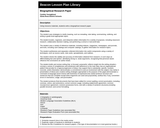
Using resource materials, students will write a biographical research paper.
- Subject:
- English Language Arts
- Material Type:
- Lesson Plan
- Provider:
- Beacon Learning Center
- Author:
- Beacon Learning Center
- Date Added:
- 04/23/2019

Using resource materials, students will write a biographical research paper.
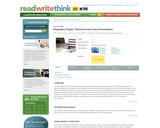
This lesson sets the stage for high-interest reading with a purpose through a biography project. Students work together to generate questions they would like to answer about several well-known people, then each student chooses one of these and finds information by reading a biography from the library and doing Internet research. Students create a graphic organizer (a web) to organize the facts they have found and share what they have learned about their subjects through oral presentations. Students evaluate themselves and their classmates by using a rubric during the research and graphic organizer-creation process and by giving written feedback on one another's presentations.

In this lesson, students will analyze written documents for position of writer and content. They will then synthesize a historical position based upon document analysis and connect historical struggles for equality with current movements.

Birth of a Colony explores the history of North Carolina from the time of European exploration through the Tuscarora War. Presented in five acts, the video combines primary sources and expert commentary to bring this period of our history to life. The opening segment describes the forces that motivated European exploration and colonization of the New World. Explorers and colonists encountered native peoples with agricultural lifestyles, strong communities, and respect for the land. These Indian communities saw themselves as part of nature, and they lived in harmony with the natural world. Their spiritual practices, such as the Green Corn Ceremony, reflected this worldview. The Europeans came to the New World primarily in search of land and riches. With two such different cultural viewpoints, clashes were inevitable. This teacher's guide includes a strictly social studies lesson and a complementary ELA lesson (writing assignment).

In this secondary source lesson on ancient Greek civilization, students will explore this story through text dependent questions, academic vocabulary, and writing assignments.
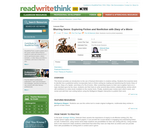
This lesson provides an introduction to the use of factual information in creative writing. Students first examine texts to identify how a published author incorporates facts in fiction writing by reading and questioning the books Diary of a Worm, Diary of a Spider, and Diary of a Fly (Cronin). After conducting inquiry on their own to gather facts on a topic decided upon by the class, students use their facts to write several diary entries collaboratively, entries which will contribute to a class book modeled on the mentor texts. Finally, students peer review each other’s work, and revise and edit their own writing before using the Multigenre Mapper interactive to publish their work.
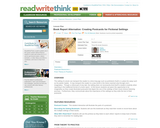
In this lesson, students are given the opportunity to be imaginative as they create illustrated postcards that depict one of the settings of their novel choices featuring journeys. Furthermore, they communicate about the importance of the settings as they write the text of their postcards.
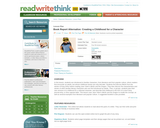
In this lesson, students are introduced to familiar characters, from literature and from popular culture, whom readers first encounter as adults, but whose childhood stories are only told later. Students first discuss Merlin from the stories of King Arthur before reading Jane Yolen's Merlin and the Dragon. They then discuss the characteristics and stories of other familiar literary characters who are first introduced as adults. Then, in groups, students plan their own versions of a childhood for a selected character, and describe that childhood in the form of a short story, journal entry, or time capsule letter. This lesson uses Jane Yolen's Merlin and the Dragon to model the concept, as well as several examples from literature and popular culture. A suggested booklist is also provided.
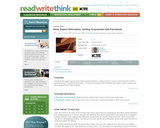
Facebook-like pages used as book reports provide students a unique format to review several elements of fiction typically found in a traditional book report. Through the sharing of their Facebook-like pages in class, students will have suggestions for future reading.
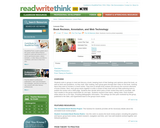
Students work in groups to read and discuss a book, keeping track of their feelings and opinions about the book, as well as facts and quotations, as they read. Students then decide which parts of their review they wish to annotate, with each student in the group responsible for one topic. Each student writes about his or her topic, including bibliographic information.

Ruri, a young Japanese girl, and her family are taken to an internment camp during WWII because the US government was afraid Japanese Americans would ally with Japan. In this CCSS lesson, students will explore this story through text dependent questions, academic vocabulary, and writing assignments.
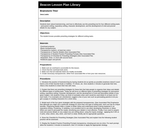
In this lesson, students will learn about brainstorming and how to effectively use this prewriting tool for four different writing tasks - persuasive writing, expository writing, character development, and the development of vivid and precise details for any subject.
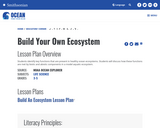
Students will create a model aquatic ecosystem and make regular observations over a period of time. They will also work collaboratively to conduct research on common ocean health issues and summarize their findings in a written report.

This article describes scientists Ken and Molly Glander’s research on the eating habits of howler monkeys in Costa Rica. In this CCSS lesson, students will explore this story through text dependent questions, academic vocabulary, and writing assignments.

Chuck Close is an American artist who overcomes many obstacles in his life, both unexpected and self-induced. He overcame his first obstacle early in his childhood when he didn’t let his learning disorder stop him from becoming an artist. Later in his career, doctors told him his career was finished, but Chuck found a way to continue painting without full use of his body. In this CCSS lesson students will explore this story through text dependent questions, academic vocabulary, and writing assignments.
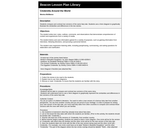
In this lesson, students compare and contrast two versions of the same fairy tale. Students use a Venn diagram to graphically illustrate the similarities and differences in the two stories.

Panchito, a young migrant worker, lives life with his family on the circuit—a cycle of seasonal crop harvesting. Each move on the circuit is signaled by the appearance of cardboard boxes, which hold all the family’s possessions. In this CCSS lesson, students will explore this story through text dependent questions, academic vocabulary, and writing assignments.

In this CCSS lesson students will explore citizenship and government in Athens through text dependent questions, academic vocabulary, and writing assignments.
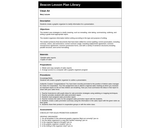
In this lesson, students create a graphic organizer to clarify information for a presentation.
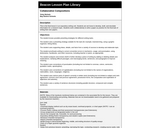
In this lesson, students will develop, draft, and elucidate information for a research topic. Students will work collaboratively to write a paper as practice for the final task of writing their own papers.